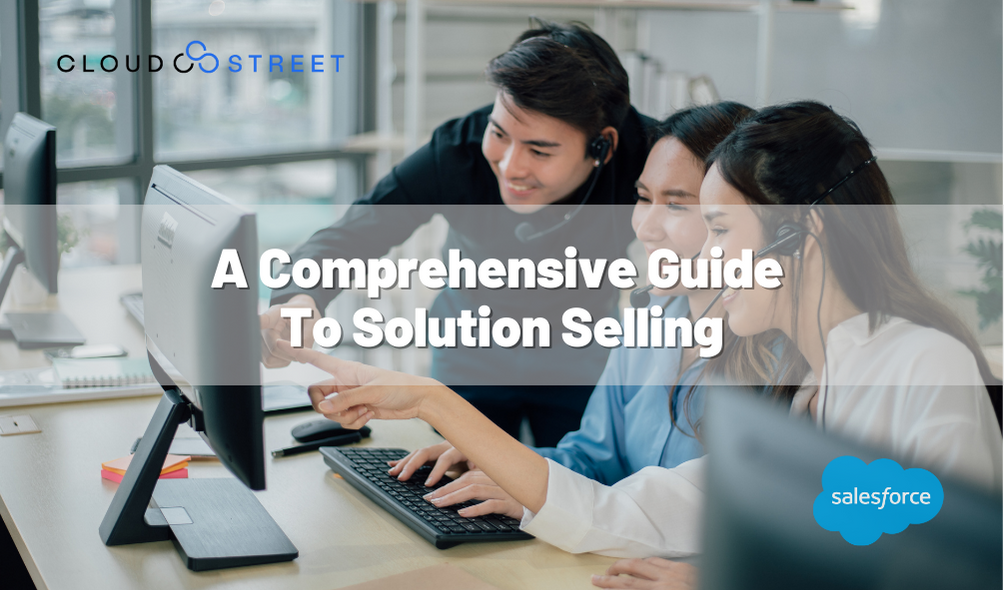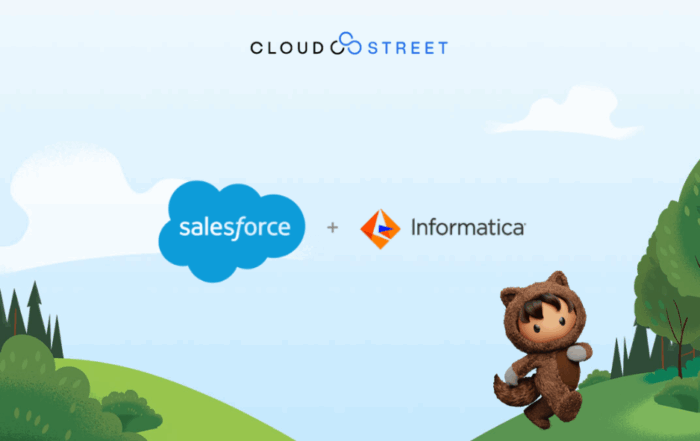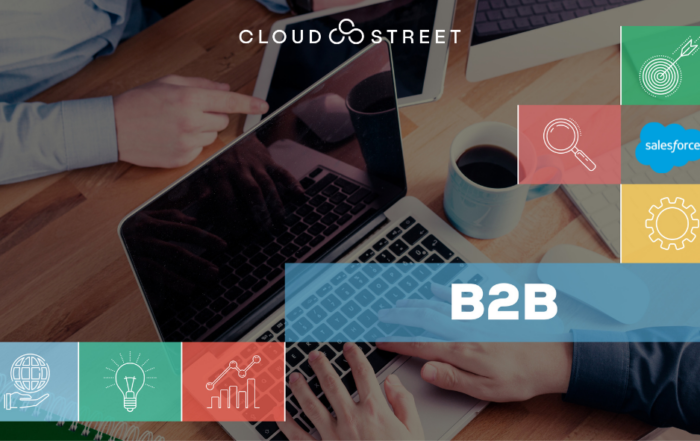A Comprehensive Guide To Solution Selling

There are a number of different sales strategies and enticing techniques that can be mastered to secure results for both customers and corporations. But, it is solution selling that seeks to solve your prospects’ market challenges with an empathetic approach and avoids the notion of sales reps being unscrupulous.
Instead of pushing a product or service, solution sales is a methodology where the sales rep becomes a trusted advisor, which is what 87% of business buyers expect from these partnerships.
Here, we will examine the Salesforce solution selling approach that can be used by any solutions-based service provider to help their prospective clients identify business pain points and overcome market challenges.
Understanding Solution Selling
Solution sales require a sales rep to dig into the needs of their prospective customers and be ready to recommend the best products or services that fit their specific problems. Solution selling focuses on tangible results for the customer and is similar to consultative selling, which is grounded in customer relationships. But, solution selling is different from transactional sales, because it is not focused on closing a deal, but on creating a partnership beneficial to the client, their customers, and the sales rep.
The customer-centric nature of the solution sales technique demands that the service provider examine the customer’s market opposition, which may include inadequate marketing efforts, incorrect pricing, low-quality products, a lack of service uniqueness, or poor customer service.
Solutions selling will focus on providing strategies, software, or services to solve business challenges, and each customer will demand a tailored solution based on their target customers, their products or service line, and what market challenges they are facing.
Why Solution Selling Services are Critical
Today’s business owners are faced with a slew of emerging technologies and business practices that promise a return on their investment. Your job is to convince the client that your recommendations or product lines are not simply feature-rich, but are the solution your client needs. This is accomplished by building trust and rarely is trust built by treating the client like an opportunity. Instead, it’s about handling the opportunity in the right way.
Solution selling is focused on your prospects’ needs, which can be ascertained with just a few probing questions:
- What are their goals and challenges in achieving those goals?
- What customer problems or market pain points are they facing?
- What would a successful outcome that solves their needs look like?
Solution selling means being empathetic to your client’s needs while also being business savvy. While it is important to understand the buyer’s industry, challenges, and goals, you must also be ready to offer intelligent business solutions, such as artificial intelligence (AI), customer relationship management (CRM), cloud computing, and the Internet of Things (IoT).
When is solution selling the right approach?
Almost any sales scenario will benefit from solution selling. However, it is best applied when your prospects have a unique problem or serve a “niche” industry. Consider the following industries that typically feature the right characteristics for solution selling techniques:
- Corporations that must deal with regulatory compliance requirements, such as the financial and pharmaceutical industries.
- Software companies, industrial manufacturers, or IT consulting with a long sales cycle or high-value sales
- Industries that feature constantly evolving technology, such as healthcare and telecommunications
In each of these instances, the solution sale will differ from the traditional sales process because it will highlight the challenge, show that it is fixable, and then help the buyer make plans to solve the problems.
The Key to Successful Solution Sales
When your focus is on selling a “solution” and not a “product”, you can’t discuss steps to your client’s success if you don’t fully understand the challenges and needs of where your prospect is now, and where they want to go in the future.
Here’s a series of steps you can follow when perfecting your own solution sales techniques:
1. Know your customers and their priorities
Your sales conversations with prospects will change to discovering the details of their market sector and their target customer. This means exploring your company’s buyer personas, which is the theoretical information concerning the organization, the customers, and the pain points this industry deals with most often.
It is helpful to use your customer relationship management products in conjunction with AI or artificial intelligence (AI) to gain an indepth knowledge of your client’s biggest priorities, the obstacles that stand in their way, and what they stand to lose if you can’t fix this problem.
Finally, use your discovery call with the potential client to find out what solutions they have already tried and what they stand to gain if and when you solve their challenges with your service or product. This type of customer understanding happens with 1:1 communications that can uncover the customer’s hidden circumstances and not-so-transparent needs. Armed with this information, your sales team can better assess how your solution will fit into the client’s bigger picture.
2. Know your solution inside and out
Even though you may not be selling a product, you still must understand every feature of your solution and how they can solve your customer problems. With a good foundation built on knowledge of your customer’s basic needs, you can build the relationship by mapping your product’s features to those challenges to identify potential solutions.
To more quickly understand your product’s features, consider attending a live or pre-recorded demo of your product. Also, make a habit of taking notes and summarizing what you learn from prospects, especially when listening to your customer’s calls.
3. Tailor your product and pitch to meet their challenges
While traditional sales calls may benefit from a proven, yet standard pitch, when selling your customers a solution, it must be tailored to their needs. You gain a good reputation when you demonstrate you have a deep understanding of the problems they’re experiencing. This makes your prospects more open to the solutions you are mapping out to solve their business challenges.
The goal is to present your value to the client at every stage of the process. Once you’ve painted a picture of what the right solution for their business is, then it’s time to pitch your company’s product or service and close the deal. Be prepared to offer case studies, customer testimonials, and other data on how your service or product has been of value in solving similar industry problems.
This type of relationship-focused approach of solution selling continues throughout the sales funnel all the way up to closing the deal and beyond. In fact, our State of Sales Report highlights that the ongoing relationship with a customer is a growing area of focus for sales teams: 80% of sales reps say maintaining customer relationships after the close is increasingly important, and 92% say they are at least partially evaluated on post-sale metrics like customer value and customer retention.
Salesforce Solutions Selling and AI Products
Salesforce offers sales solutions that give your customers long-term success by focusing on their long-term vision and eliminating current industry or marketing challenges. Instead of a temporary or transactional relationship, our sales solutions are designed to promote partnerships that last.
When you implement Salesforce’s solution selling techniques, your customers gain access to more efficient business operations that can bring a recurring source of revenue. Our sales solutions, when coupled with our Custom AI Builders, result in unique recommendations that are clear-cut and customize to meet the needs of each customer.
Discover insights that drive results - explore out latest blog posts now
Salesforce Data Cloud vs. Informatica Intelligent Data Management Cloud: A Comparative Analysis
Salesforce Data Cloud vs. Informatica Intelligent Data Management Cloud: [...]
Unlocking B2B Success with Salesforce Experience Cloud
Unlocking B2B Success with Salesforce Experience Cloud In today’s [...]
Future-Ready: How AI is Shaping the Mid-Market Manufacturing Landscape
Future-Ready: How AI is Shaping the Mid-Market Manufacturing Landscape [...]


